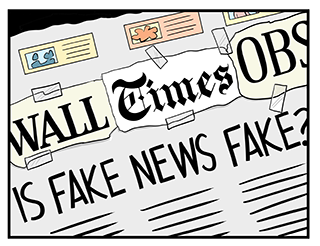Social Media and Fake News

According to the most recent estimates, more than 4 billion human beings are now online.1 In the United States, 68% of the population uses Facebook and most of these users visit the site multiple times each day.2 In recent surveys, more than two thirds of Americans report that they get news about the world from social media platforms.3
It might not seem surprising that so many people turn to social media for news and information, but these platforms are not operated by journalists. If we rely solely on our social media feed to inform us about the world in which we live, we are essentially allowing a small number of our online peers to influence information we receive about the world.
For much of the previous century, our global media landscape looked much different than it does today. There were far fewer options. Most media outlets were owned by a handful of large corporations, they were used mainly for top-down communication, and ordinary citizens were not able to broadcast their thoughts and feelings to a mass audience. As the old saying goes, “freedom of the press belongs to the person who owns one.”
The rise of the Internet and mobile digital media upended this power dynamic, unleashing a tidal wave of creative energy. Armed with little more than a computer and a net connection, musicians, activists, entrepreneurs, and anyone with something to say could speak to the entire world with the touch of a button.
A recent study found that people who aren’t particularly interested in current events are more likely to be influenced by the posts of their online friends who do follow the news. Unfortunately, our friends do not always worry about accuracy and fact-checking when sharing links to online sources. In 2016, researchers found that one out of four Americans encountered disinformation during the weeks before the election, with Facebook serving as the “key vector of exposure to fake news.”4
“But why should we place any stock in traditional news outlets?” you ask. “Don’t journalists make mistakes?”
Despite recent hype about “fake news media,” ethical journalists on all sides of the political spectrum take their responsibilities quite seriously. Reporters follow a strict ethical code which states that journalists must act accountably and independently, seek the truth, and minimize the harm that their work might cause.5
Almost all major news sites have dedicated teams to produce social media content in varying forms. The British newspaper, The Guardian, has a YouTube channel where they post interviews with influential people. Similarly, magazines like People, Cosmopolitan, Bon Appétit or GQ have stories on Snapchat where they share content online. Finally, broadcast news stations like CNN or Fox have pages that you can follow on Instagram or Facebook to get breaking news. Following a news outlet or independent journalist that abides by the journalistic standards is one way to ensure that you are getting fact-checked news.
There is still a place for citizen journalism. There are many examples of ordinary citizens who picked up their cell phone or laptop to document their perceptions of breaking news in real time. Realizing that this power also comes with great responsibility, many home-grown reporters are engaged in conversations about how to behave ethically online[6] If you are one of these citizen journalists, the spread of disinformation by others should not stop you from speaking your mind to the world.
As a consumer, when you encounter intriguing or unpredictable news on your social media feed, you should take a moment to consider the source. What do you know about this person? How does the author’s perspective compare with what others are saying? If the source claims to be an established news agency, what do you know about this agency?
References
1 Miniwatts Marketing Online (2017, December 31) “Internet usage statistics: World Internet users and 2018 population stats,” Internet World Stats. Retrieved from: https://www.internetworldstats.com/stats.htm
2 John Gramlich (2018, April 10) “5 facts about Americans and Facebook,” Pew Research Center.
3 Elisa Shearer and Jeffrey Gottfried (2017, September 7) “News use across social media platforms 2017,” Pew Research Center.
4 Andrew Guess, Brendan Nyhan, and Jason Reifler (2018, January 9) “Selective exposure to misinformation: Evidence from the consumption of fake news during the 2016 U.S. presidential campaign,” European Research Council.
5 Society of Professional Journalists (2014, September 6) “SPJ Code of Ethics,” Society of Professional Journalists.
[6] Ron Ross and Susan Carson Cormier (2010) Handbook for Citizen Journalists. Aurora, CO: National Association of Citizen Journalists.
